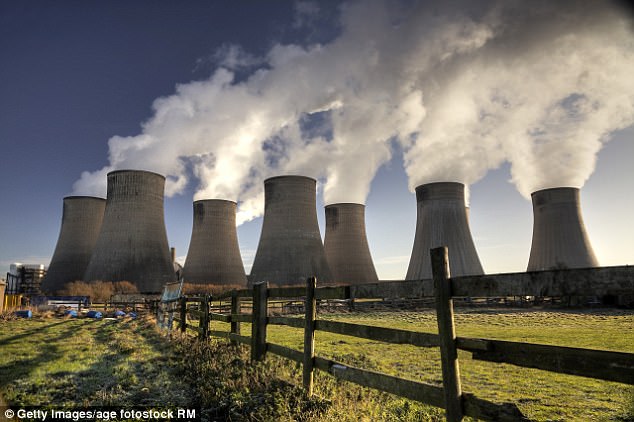- Details
- Hits: 7388
 Our article entitled "Net Zero they do not have a Clue" has garnered a big responce, we penned it on 22nd June 2023 with a big section devoted to the Parliamentary debate covered by Hansard.
Our article entitled "Net Zero they do not have a Clue" has garnered a big responce, we penned it on 22nd June 2023 with a big section devoted to the Parliamentary debate covered by Hansard.
The image shown is part of the problem: 8 cooling Towers sending 65-70% of the Heat Energy in a Centralised Electricity Generating plant up into the sky! This cannot continue - Generation INEFFICIENCY is a major issue with the Centralised Power Network, both in the UK and other nations. It is too inefficient - so those EV vehicles getting their {electrical} charge from the 'mains' are just "importing" their waste.
But now Reuters reports, of news from Shell and BP, tends to indicate serious reservations - and thus COLD FEET!! Litterally!
See the Reuters Report in Full below: Web Linkage: https://1.reutersevents.com/LP=36061,
""Net zero and hydrocarbons – a case of and, not or""
""Media reports that Shell is taking an axe to jobs in its low-carbon solutions and hydrocarbon units -- Reuters reporting in October that around 15% of the Anglo-Dutch supermajor’s workforce would be cut -- have reinforced concerns that the industry’s commitment to net zero may be eroding in a high commodity price climate.
According to the reports, 200 jobs will go in 2024, with another 130 will be placed under review by the company.
The news represents a potential challenge for a company whose low-carbon division was intended to spearhead a transition to clean energy.
But it is not alone. BP – the first oil major to set a course to net zero back in 2020 – has also faced criticism from environmental activists over a scaling back of ambitious emission reduction targets. Climate-focused investors reacted negatively to BP’s February 2023 announcement that it would aim for a 20-30% cut to emission by 2030, compared to 35% previously.
- Details
- Hits: 33322
 Spending watchdog MPs on the Public Accounts Committee are concerned about lack of transparency, [and] about the cost to consumers of the Government’s plan to expand nuclear, solar and wind power.
Spending watchdog MPs on the Public Accounts Committee are concerned about lack of transparency, [and] about the cost to consumers of the Government’s plan to expand nuclear, solar and wind power.
In addition, the focus on "Carbon Capture Measures" are particularly worrying, from both a cost and desirability aspect, as it blindly accepts the premise that CO2 is a "Causation" of; Global Warming {?} or now "Climate Change". No latitude is given any any dissenting viewpoints such as Dr. Patrick Moore Lee Yun-Jeong Dr Richard Lindzen, even David Ballamy - In 2008 Bellamy signed the Manhattan Declaration, calling for the immediate halt to any tax-funded attempts to counteract climate change. He maintained a view that man-made climate change is "poppycock", insisting that climate change is part of a natural cycle!
In addition Energy Efficiency improvements both in buildings and in the Centralised Electricity systems are not given sufficient prominence - a tragedy considering their "low hanging fruit" aspects and inexpensive improvements. Particularly in the UK's Housing Stock {24.2 million} and the problems with building so few new {and highly energy efficient} properties. New Build Completions; 204,530 {to March 2022} AND 210,320 {to March 2023} and 6 months to September 2023 of 93,480 Completions - and much fewer starts due to Covid Lockdown {insanity}} [Housing, Commercial Retail and Industrial].
The Government estimates that up to £400 billion of public and private investment in new generating capacity will be needed by 2037, but the PAC is unconvinced that the private sector has been given enough clarity to confidently invest.
In a critical report published below {on 15th June 2023}, the PAC calls on Government to pull together numerous decarbonisation plans into coherent strategy. This should be pulled together by autumn 2023 at the latest.
The Government’s delivery plan must also set out when and how the costs of decarbonising the power sector will be likely to have an impact on energy bill payers and taxpayers.
Dame Meg Hillier MP, Chair of the Committee, said: “What is the plan? It has now long been understood and accepted that greening our economy is an existential priority, with the Government setting itself the target of securing an entirely low-carbon power supply by 2035.
- “But without a coherent delivery plan to get there, the Government will find it harder to know what decisions it must take, and when, to ensure that it can realistically reach its ambitions.
- “There are just twelve years left for the Government to meet its low carbon energy target, and much still to do if this is to be achieved – and at a cost the taxpayers and bill payers can bear while ensuring the lights stay on.
- “There is an information vacuum in key areas – energy efficiency, investment, the cost of the transition to the public – that must be addressed.
- “We need an overarching plan charting the way, to provide much-needed confidence to the businesses and consumers who are needed to deliver it. When it comes to tackling the climate crisis, we can see around us, we are already living on borrowed time.”
Actual Discussion and oral Evidence: On following pages
- Details
- Hits: 7400
With air source and ground source heat pumps what are the key requirement to enable cheap and efficient heating and hot water in the UK?
In order to enable cheap and efficient heating and hot water with air source and ground source heat pumps in the UK, there are several key requirements:
 'Adequate' {Extremely High Levels of:} insulation: The building must have adequate insulation to minimize heat loss and improve the efficiency of the heat pump system. By "Adequate" we mean' substantially in excess of current building regulations standards'. Like the German Passivehaus standard. This would also presuppose an efficient {mechanical or passive} ventilation system with heat exchanger technology and "Earth Pipes" to pre-heat [winter] or pre-cool [Summer] incoming fresh air. See Passivehaus article HERE AT THIS WEB LINK.
'Adequate' {Extremely High Levels of:} insulation: The building must have adequate insulation to minimize heat loss and improve the efficiency of the heat pump system. By "Adequate" we mean' substantially in excess of current building regulations standards'. Like the German Passivehaus standard. This would also presuppose an efficient {mechanical or passive} ventilation system with heat exchanger technology and "Earth Pipes" to pre-heat [winter] or pre-cool [Summer] incoming fresh air. See Passivehaus article HERE AT THIS WEB LINK.- Proper sizing of the system: The heat pump system must be properly sized to match the heating and hot water demands of the building. Over-sized or undersized systems can result in inefficiencies and higher costs.
- Suitable location: For ground source heat pumps, the site must have suitable geology and hydrology to support the installation of the ground loop. For air source heat pumps, the location must have adequate airflow and temperature differentials to enable efficient operation.
 High-efficiency heat pump equipment: Choosing a high-efficiency heat pump with a high coefficient of performance (COP) can significantly improve the efficiency and cost-effectiveness of the system.
High-efficiency heat pump equipment: Choosing a high-efficiency heat pump with a high coefficient of performance (COP) can significantly improve the efficiency and cost-effectiveness of the system.- Energy-efficient hot water storage: Using an energy-efficient hot water storage tank can reduce the amount of energy required to heat water and improve the overall efficiency of the system. This is because an highly insulated hot water storage tank can act as a 'buffer' or heat-store, between energy supply and demand - particularly relevant at colder period, say night time in winter - so supplement the energy needs from the heat store.
- Climate-appropriate design: The design of the building should take into account the local climate and weather conditions to optimize the performance of the heat pump system. This would also include aspects of the property and its orientation {to the Sun, and prevailing winds}, earthworks and planting to mitigate 'wind chill' effects on walls, windows and roofs. PDF scan of 1981 Research Article {Wind and Building Energy Consumption: an Overview} HERE
By meeting these requirements, air source and ground source heat pumps can provide cost-effective and efficient heating and hot water in the UK. As can be seen in some of the photo's, particularly with Ground-Source Heat Pumps, associated equipment, controllers, buffer tanks and installation, considerable space is needed. Therefore we strongly recommend new properties be build with a basement {in light of the deeper foundations required from Building Control this may not be as expensive as imagined}. Additional benefits of basement include, Rainwater Storage, Computer Sever Room, Distribution to the floor above for Internet, Telephone, Sound Systems etc.
- Details
- Hits: 5429
This report expands on the Location of DevelopmentLocation of Development series of research examining the location of approved planning applications for major residential developments across England. Using new data sources, this research seeks to explore the accessibility of these new developments to a variety of different amenities.
You can download the report here or read in full below
Report authors
Samuel Spencer, RTPI Policy and Data Analyst
David Pendlebury, MSc
Acknowledgements
![]()
This report has been made possible thanks to the use of transport data originating from the Department of Transport (DfT) and provided by the National Audit Office (NAO) as well as thanks to a private database of planning approvals that was curated and made available by LandTech.
Executive Summary
This report builds on the Royal Town Planning Institute’s Location of Development work series commenced in 2015. This third report analyses planning permissions granted between 2015-2019 in England.
The location of new development, defined in this report as recent planning permissions for new major residential housing, can significantly impact accessibility to key amenities for residents across England in several ways including:
- Access to amenities that support economic opportunities, healthcare services, and educational facilities varies widely by location and mode of transport or new planned developments.
- In locations with a major agglomeration of jobs such as London and the North West, reaching key amenities by public transport takes less than an hour. In other regions, a comparable journey can take nearly twice as long.
- This research highlights the stark differences across England. For example, in the 10% most accessible planned developments, access to jobs and educational facilities will be within a 30-minute walk. In the 10% least accessible planned developments, access to the same facilities will be over 90 minutes walking time away.
- We analysed new residential developments in England based on the location of planning permissions approved between 2015 and 2019. This showed that access to amenities from these locations is twice as fast by car compared to public transport, and nearly three times quicker than by walking. Average public transport travel times to hospitals or large employment centres were also comparable or slower than walking, which may not be a realistic option for all residents of these new developments.
The impacts of such diversity in the location of development are potentially severe and wide ranging. This report recognises that some individuals will make a personal choice to live in more isolated locations. However, there is a significant proportion of planned development and major housing sites which be poorly connected to key amenities by any modes, including the most sustainable, healthy and affordable transport options.
This impacts on those who live in the least accessible of new developments in multiple ways. They will have less access to economic opportunity, reduced access to - and choice of - healthcare and educational provision, and fewer options to choose their mode of travel.
Where there exists a positive link between accessibility to key services and house prices, a lack of accessibility will serve to widen economic and health inequalities. New communities with poor accessibility encourage private vehicle dependent travel, which undermines initiatives to encourage sustainable transport use in line with net zero objectives and promote healthy lifestyles.
- Details
- Hits: 20347
Basements for housing
Including a basement in residential developments helps maximises usage of available land, offers added value, more space and accommodation with additional performance benefits. Refurbishment or alterations to existing spaces below ground are also an effective way of providing additional habitable space to a property. It is possible to retrofit a basement under or adjacent to an existing property.
A basement story is defined within the Building Regulations of England and Wales as at least 1.2m below adjoining ground level. This aspect has implications for natural lighting and ventilation. For much deeper structures there are several other options to cover there two important issues.
Benefits of domestic basements include:
- Added value.
- Additional habitable or useful space.
- Increased floor area in locations with limited development potential above ground.
- Creation of flexible, adaptable space, due to creation of single span structure.
- Spaces with extra sound insulation, expanding range of potential use, including home working, home cinema or wine cellar!
- Spaces with good thermal mass and potential energy efficiency and cooling.
- Good stable structural base, capable of supporting heavy loads above.
- Resilience to local environmental effects in the soil, such as shrinkage or tree roots.
- Flood resilience solution, by raising habitable spaces above flood level while providing useful non-habitable storage space below.
Basement design
The appropriate design of basements is well established and achievable providing design and construction guidance is implemented.
Basement design process simplified:
- Establish current and anticipated future use of basement.
- Site survey and soils analysis including exploratory works.
- Design proposals to define type of construction water tight class, ventilation and thermal performances.
- Detailed structural design integrated with design of waterproofing/drainage.
- Utilities entry, Earth Pipes etc and construction waterproofing, detailing etc
Aspects of the design process are interrelated and a unified approach should be established defining roles and responsibilities of the design team. It is advisable to avoid complex geometries to facilitate waterproofing and to produce a three dimensional review of structure and waterproofing.
Basement construction
Reinforced Concrete is the most common and appropriate material used in the construction of new basement walls and floors. This is due in part to cost and availability but also its adaptability, inherent resistance to water, durability underground and ability to provide a stable structural surface for the support of waterproofing membranes. Options include masonry or blockwork, cast insitu, precast concrete, twinwall and insulating concrete formwork (ICF). The graphic shown has an insulated layer on the outside of the basement wall - however most practical is Insulated Concrete Formwork [ICF]
The method of concrete construction chosen will be influenced by the type of waterproofing protection permitted according to the water table situation and proposed basement use as described in BS8102 Code of Practice for the protection of below ground structures against water from the ground.
For further guidance on the benefits of basements for housing and principles of construction and design refer to Basements for Housing.
The publication ‘Concrete Basements: Guidance on the design and construction of in-situ concrete basement structures’ provides comprehensive guidance on the design issues for the design of deep basements, focusing on structural calculations.
Other useful resources:
